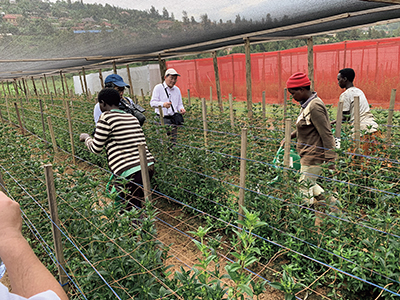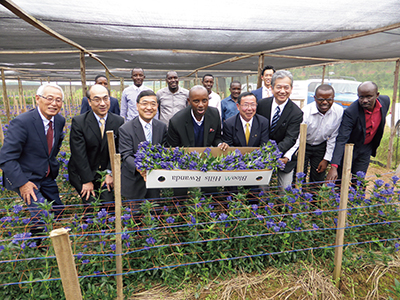Diplomatic Bluebook 2021
Chapter 3
Japan's Economic Diplomacy to Promote National and Global Interests
3 Promotion of the Export of Agricultural, Forestry and Fishery Products and Food (Regulations on Japanese Food Imports after the Great East Japan Earthquake)
Expanding exports of Japan's agricultural, forestry, fishery and food products is a major objective of the Government of Japan. To further promote concerted efforts by the Government in this vein, the “Ministerial Meeting on Expansion of the Export of Agricultural, Forestry, and Fishery Products and Foods as a Response to Restrictions by Importing Countries” was established in April 2019. After conducting interviews with all businesses and other organizations involved, a list of tasks was raised up and a response plan was formulated in June 2019. Furthermore, the Act on Facilitating the Export of Agricultural, Forestry, and Fishery Products and Food was established in November and entered into force on April 1. This law governs the development of systems for mounting a quick cross-government response to food safety regulations imposed by any countries and regions importing such products. Following this, a new target was established that seeks to achieve 5 trillion yen in exports of agricultural, forestry, fishery and food products by 2030 (the Basic Plan for Food, Agriculture, and Rural Areas; approved by the Cabinet on March 31, 2020). All Government agencies have since been working toward further increasing these exports (see the Column on page 198).
MOFA enthusiastically promotes the attractiveness of Japanese products by collaborating with the relevant ministries and agencies, as well as Japanese companies and local governments, utilizing the networks of organizations such as diplomatic missions overseas as well as social media and other tools. In particular, Japanese business support officers (in charge of the food industry) have been assigned to 58 diplomatic missions overseas in 54 countries and regions to strengthen initiatives to promote the export of agricultural, forestry and fishery products and food. Japan has made energetic efforts toward such promotion at numerous opportunities such as receptions and cultural events to which dignitaries have been invited from countries and regions around the world.
One of the biggest barriers to increase exports is import restrictions on Japanese agricultural, forestry and fishery products and food by countries and regions following the Great East Japan Earthquake and TEPCO's Fukushima Daiichi Nuclear Power Station accident. Although ten years have passed since the Great East Japan Earthquake, the fact is that 16 countries and regions out of 54 (as of December 2020) continue to impose import restrictions on agricultural, forestry, fishery and food products from Japan, and it remains a serious problem. As eliminating these restrictions and addressing Japan's reputational damage are top priorities for the Government of Japan, MOFA has been making efforts in collaboration with relevant ministries and agencies to have these restrictions lifted as quickly as possible.
As a result of these efforts, in 2020, import restrictions were lifted in the Philippines (January), Morocco (September), Egypt (November), the United Arab Emirates (December) and Lebanon (December). So far, 38 countries and regions have removed their import restrictions: Canada, Myanmar, Serbia, Chile, Mexico, Peru, Guinea, New Zealand, Colombia, Malaysia, Ecuador, Viet Nam, Iraq, Australia, Thailand, Bolivia, India, Kuwait, Nepal, Iran, Mauritius, Qatar, Ukraine, Pakistan, Saudi Arabia, Argentina, Turkey, New Caledonia (territory of France), Brazil, Oman, Bahrain, the Democratic Republic of the Congo, Brunei and the five above-mentioned countries. Furthermore, due to the relaxation of restrictions by Singapore, the U.S. and Indonesia, the number of regions with import restrictions and the number of restricted product categories has gradually decreased (as of December 31, 2020).
Working closely with the relevant ministries, agencies, local governments and international organizations, MOFA will continue taking every opportunity and making every effort to provide explanations and appeal to countries and regions that maintain import restrictions, with the goal of having restrictions promptly removed and reputational damage repaired based on scientific evidence.
Hachimantai City in Iwate Prefecture is a city with lush greenery. Its rich natural environment surrounded by the Ou Mountains, hot springs, ski resorts, and other attractions draw many tourists. Taking advantage of the cool climate, the Ashiro district in the northwestern part of the city has been producing gentians (rindo) since 1972. The Hachimantai City government operates the research and development facility, which has concluded a joint research contract with Ashiro Rindo Development, a general incorporated association comprising floriculturists, to engage in the development of original gentian varieties. The floriculturists contribute 2% of their sales revenue as research cooperation fees, thereby realizing a stable operation of the organization as well as the establishment of a consistent system; from variety development to production guidance built upon the views of the floriculturists. Through these, Hachimantai City has become Japan's top gentian production area accounting for more than 30% of domestic demand.
 Gentian cultivation in Rwanda (Photo: Hachimantai City)
Gentian cultivation in Rwanda (Photo: Hachimantai City)Hachimantai City is currently working on the export of intellectual property aimed at promoting the industry by facilitating the worldwide use of gentian varieties cultivated and trademarked as “Ashiro Rindo” gentians. The move toward the overseas business expansion of “Ashiro Rindo” gentians began when the production of flowers to decorate venues of the national ski competition held in February 1998 was outsourced to New Zealand, in the southern hemisphere, where the seasons are opposite. Thereafter it was decided that “Ashiro Rindo” gentians produced in New Zealand during the winter season in Japan would be reimported into Japan, thereby realizing year-round sales in the Japanese market. In this context, although there had been no initial plans to export intellectual property from Japan, with New Zealand being a country with a thriving flower export sector, the export of intellectual property for gentians started since New Zealand floriculturists hinted exporting the intellectual property of Japanese flowers. In recent years, a collaborative research with Mizuho Research & Technologies, a private company in Japan, for three years since 2015 on the feasibility of floriculture in Rwanda, Africa verified technologies enabling year-round supply. In 2018, a cultivation license agreement was concluded with a local corporation in Rwanda, and export to Europe commenced. This led to exchanges with Hachimantai City as the host town of the Rwanda team for the Olympic and Paralympic Games Tokyo 2020.
 Japanese and local officials delighted with the first shipment of “Ashiro Rindo” gentians produced in Rwanda (Photo: Hachimantai City)
Japanese and local officials delighted with the first shipment of “Ashiro Rindo” gentians produced in Rwanda (Photo: Hachimantai City)As explained above, Hachimantai's export business is not exporting produce, but exporting intellectual property. The royalties (fees for the use of trademark rights) earned through such exports are utilized to improve varieties and develop new varieties. 2021 marks 50 years of gentian production in Hachimantai City. The City aims to continue to be a production area of gentians for a century, and is confident that it can contribute to the development of the African region through the branding of “Ashiro Rindo” gentians produced globally as a high value-added agricultural product. To that end, it will continue going forward with its undertaking in this sector.

